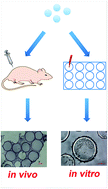In vivo microcapsule implantation suffers from varying degrees of inflammatory responses. Considering the complications of the implantation process and the individual variation in laboratory animals, a feasible model, constructed in vitro by culturing fibroblasts on the surfaces of different types of microcapsules, is established in the present study. A high consistency is shown between the cell adhesion on beads or microcapsules based on the developed model in vitro and their fibrosis formation after implantation in vivo, which can be used to evaluate the biocompatibility of the microcapsules. Moreover, the relationship between the surface properties of the microcapsules and the cell adhesion behavior was explored using this developed model. It was found that cell adhesion was aggravated with chitosan reaction, but was reduced with alginate neutralization. This was closely related to the variation trend of surface charges, but not surface roughness and the stiffness of alginate-based microcapsules during the process of chitosan coating and alginate neutralization. This model could therefore provide a rapid evaluation and guidance to tailor the optimal surface properties for long-term transplantation.

